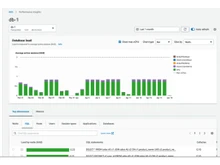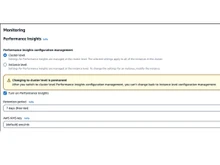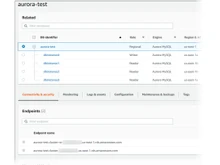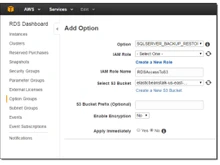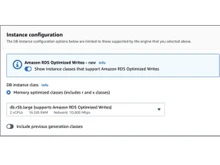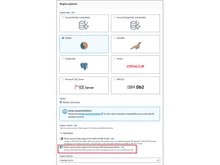Choosing the best and optimal relational database software for your application within the Amazon Web Services (AWS) ecosystem is challenging. Therefore, it becomes important to understand the differences between Amazon Aurora and Amazon Relational Database Service (RDS). By delving into the distinctions between these two services, you can make a well-informed decision regarding the most suitable database solution for your specific requirements. We will further evaluate them based on key differences, features, durability, performance, scalability, capacity planning, and other factors.
Aurora vs RDS: An Overview
Amazon Aurora is a purpose-built, cloud-native architecture optimized for high performance and scalability. It is known for high-speed performance with distribution, fault-tolerant storage, and automatic scaling for read operations. Apart from that, it provides a high-availability design with automatic failover and up to 15 read replicas for scaling out read workloads. It is compatible with MySQL and PostgreSQL, offering seamless integration with existing applications and tools for these engines.
Amazon RDS on the other hand, offers a broader range of database engine options, including MySQL, PostgreSQL, MariaDB, Oracle, SQL Server, and Amazon's own Aurora. It provides good performance, high availability through Multi-AZ deployments, and manual scaling with read replicas for certain database engines. Moreover, it supports automated backups with retention period options and various security features such as encryption and IAM integration.
Aurora vs RDS: Key Differences
- Amazon Aurora offers cloud-native architecture optimized for high-speed performance, while Amazon RDS offers a broader range of database engine options.
- Amazon RDS and other such Amazon RDS alternatives support a wider range of database engine options, including MySQL, PostgreSQL, MariaDB, Oracle, SQL Server, and more. While Amazon Aurora is only compatible with MySQL and PostgreSQL, offering seamless integration with existing applications.
- Amazon Aurora and a few other Amazon Aurora alternatives are designed for automatic failover and up to 15 read replicas for scaling out read workloads. Whereas Amazon RDS supports manual scaling with read replicas.
- Amazon Aurora features automated storage scaling and strong security measures, including encryption at rest and in transit. While Amazon RDS provides automated backups with retention period options and various security features such as encryption and IAM integration.
AWS Aurora vs RDS: In Terms of Features
- Replication: Amazon Aurora supports automated read replica creation for scaling out read workloads. Similarly, Amazon RDS also allows for creating read replicas but doesn’t match the performance and efficiency of Aurora's replication mechanism.
- Compatibility with Database Engines: Amazon Aurora is compatible with MySQL and PostgreSQL, offering compatibility with existing applications and tools for these engines. Amazon RDS, on the other hand, offers support for a wider range of database engines, including MySQL, PostgreSQL, MariaDB, Oracle, SQL Server, and Amazon's own Aurora.
- Storage Auto-Scaling: Amazon Aurora provides automatic storage scaling to meet the demand of increasing data volume. Amazon RDS allows manual storage scaling by modifying the allocated storage for various RDS database engines.
- Security: Both Amazon Aurora and Amazon RDS offer a wide array of security features, including network isolation, encryption at rest and in transit, fine-grained access control, and integration with AWS Identity and Access Management (IAM).
- Encryption: Both Amazon Aurora and Amazon RDS support encryption at rest and in transit, providing robust security measures for data protection.
Amazon Aurora and Amazon RDS: Performance
Amazon Aurora offers high performance with purpose-built storage and a distributed fault-tolerant architecture. On the other hand, Amazon RDS provides good performance, but cannot match the raw speed of Amazon Aurora due to its different architecture.
Amazon Aurora or Amazon RDS: Scalability
Amazon Aurora is designed for seamless and automatic scaling, allowing the addition of up to 15 read replicas to offload read operations and handle growing workloads. While Amazon RDS offers scalability through the Multi-AZ deployment and Read Replicas, although the scaling process is not as seamless as in Aurora.
AWS Aurora vs RDS: High Availability
Amazon Aurora offers an automatic and high-availability design, with two copies of data in each availability zone and automatic failover. Similarly, Amazon RDS also provides high availability through Multi-AZ deployments, ensuring automatic failover in case of primary database failure.
Amazon Aurora vs RDS: Durability
Amazon Aurora ensures durability with a fault-tolerant storage subsystem, replicating six copies of data across three availability zones. On the other hand, Amazon RDS guarantees durability through redundant automated backups stored in Amazon S3 and Multi-AZ deployments.
Amazon Aurora vs RDS: Cost
Amazon Aurora is costlier than RDS due to its advanced architecture and performance benefits. Amazon RDS, on the other hand, is a more cost-effective choice for applications where extreme performance is not a primary requirement.
Amazon Aurora or Amazon RDS: Capacity Planning
Amazon Aurora simplifies capacity planning with its auto-scaling storage feature and the ability to add read replicas for scaling read workloads. Whereas, Amazon RDS requires more manual capacity planning, although it also supports the addition of read replicas for scaling read operations.
Amazon RDS vs Amazon Aurora: Monitoring
Amazon Aurora and Amazon RDS provide robust monitoring capabilities, allowing users to track database performance, resource utilization, and operational metrics through integrated monitoring tools and AWS CloudWatch.
Amazon Aurora and Amazon RDS: Infrastructure & Architecture
Amazon Aurora features a unique, purpose-built, cloud-native architecture, designed to optimize performance and reliability for cloud environments. On the other hand, Amazon RDS offers a more conventional architecture suitable for a wide range of database workloads.
Verdict: Amazon RDS vs Amazon Aurora
In summary, Amazon Aurora excels in high-speed performance, scalability, and automatic failover capabilities, providing a purpose-built, cloud-native architecture and compatibility with MySQL and PostgreSQL. It offers automated storage scaling and strong security measures, making it ideal for applications demanding stringent performance and reliability. On the other hand, Amazon RDS provides a wider array of database engine options, including MySQL, PostgreSQL, MariaDB, Oracle, SQL Server, and Amazon Aurora, catering to diverse workload types.
It also offers good performance and high availability through multi-AZ deployments, and manual scaling with read replicas for certain database engines. It serves as a flexible and economical option for a broader range of applications.


 1 Ratings & 0 Reviews
1 Ratings & 0 Reviews




